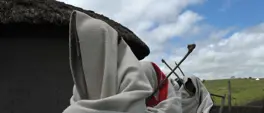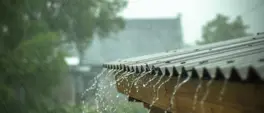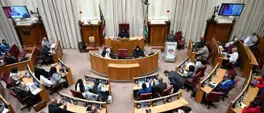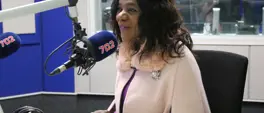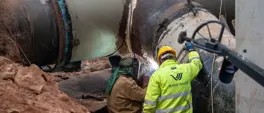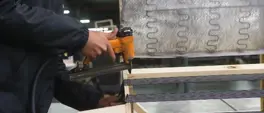PART THREE: Joburg inner city | Political instability all boils down to TEA
Orrin Singh
20 October 2023 | 10:00Part of the reason for the inner city's glaring shortcomings, other than political instability, is the inability for the illegal occupants of buildings to be provided with temporary emergency accommodation.
JOHANNESBURG - The inner City of Johannesburg (CoJ) has become a cesspool of filth, a breeding ground for crime, and a property investor's worst nightmare due to building hijackings.
Part of the problem has been the political instability within the CoJ, and the inability of the city to provide temporary emergency accommodation (TEA) for illegal occupants of buildings.
In August, the CoJ and the Johannesburg Social Housing Company (JOSHCO) - an ailing arm of the city mandated to provide and manage social and affordable rental housing - were hauled to the Johannesburg High Court by private property investors over a hijacked building they own.
ALSO READ:
- PART ONE: City held to ransom | Inside the Marshalltown building takeover
- PART TWO: City held to ransom | Good intentions turn into bad investments in CoJ
NO ACCOUNTABILITY
The Casa Mia building on Soper Road in Braamfontein has been described as a disaster waiting to happen, where frequent gunshots are often heard emanating from.
Notice of Motion by Nica Schreuder on Scribd
Peter Day of Jozi Housing, one of the applicants in the matter, said they were left with no option but to take CoJ and JOSHCO to task.
“In what city in the world will you have to take the municipality to court to ensure they enforce their own by-laws on their own building? It’s completely ridiculous when you think about it, but there is no political will to do anything about it. This building is another Marshalltown disaster in the making.”
According to JOSHCO’s 2021/22 annual report R500,000 had been allocated to Casa Mia as part of their capital project in 2017 to convert and refurbish the building into low-cost social housing units.
But none of the funds were used in the previous financial year. JOSHCO spokesperson Nthabiseng Mphela said that despite a contractor being appointed, the funds could not be utilised, because the professional team needed access into the building but couldn’t go inside to finalise their assessments and drawings.
“The motion is viewed in a very serious light. We have acknowledged and expressed our deepest concern on the matter. We approached the illegal tenants and requested for them to move, and notified the law enforcement agencies which also failed to enforce the by-laws, because the building is occupied by people who use armaments. As JOSCHO, we have begun an audit, did interim maintenance, condemned the building, and began a legal process for obtaining an eviction order,” Mphela said.
WHERE’S THE TEA?
Another ailing arm of CoJ is the Johannesburg Property Company (JPC) - mandated to repair, maintain, and develop city property.
The JPC has over several consecutive years received an unqualified audit from the Auditor-General of South Africa (AGSA).
Its 2021/22 annual report highlighted that “land invasions and illegal occupations have severe financial implications in the form of loss of assets and relocation costs to find alternative accommodation and ensure the securing of the property to prevent future invasions.”
The main stumbling block when it comes to evicting illegal occupants of a building is for the city to ensure they can provide temporary emergency accommodation.
Providing TEA rests solely on the shoulders of the CoJ’s human settlements division.
Executive Director of Human Settlements, Patrick Phophi, told Eyewitness News that the TEA programme did not form part of the “National Housing Code”, which is the basis for national and provincial funding - resulting in the program being underfunded, “as the city can only provide funding within its means.”
“The city has one source of funding for the inner city, and that funding caters for affordable rental as well as temporary accommodation. In the past 10 years, the city has been solely funding inner city developments. It was only in the 2022/2023 financial year that the department received R7 million from the National Department of Human Settlements through USDG [Urban Settlements Development Grant] for Inner City Stock Upgrading.”
The budget for the TEA programme over the last Medium Term Expenditure Framework period (three years) is as follows:
- 2020/2021: R30 million
- 2021/2022: R33 million
- 2022/2023: R15 million
Phophi said over the past three years, they have constructed some 421 units of both TEA units and alternative rental units.
“The bulk of the 421 units are alternative rents circa 2021 at Wolhuter (114 units and Skosana Court 117 units) and TEA at about the same time at Fraser House (104 units and 133 Albert Street 86 units). The budget for the year 2022/2023 was used to acquire two buildings in the inner city for conversion,” he said.
Joburg mayor Kabelo Gwamanda told Eyewitness News government had failed on all levels when it came to the inner city.
“A situation as devastating as an asset being repossessed, or hijacked or repurposed against your will as a landlord, using clandestine methods, the only thing businesses can do is report it to law enforcement, and then it becomes the role of law enforcement to do their job. When law enforcement fails, it becomes then the scope of local government, because local government have to conduct by-law enforcement - so it’s failure on different spheres of government, and it should be a collective responsibility that is taken, because the city also has an equal role in where we are right now - but so do other spheres of government.”
He said he was well aware of the disappointment expressed by the private sector regarding hijacked buildings.
“I have a vested interest in knowing the individuals responsible for various aspects in the asset management in the city of Johannesburg, so I can be able to hold the city manager to account by saying, ‘what are you doing about this?’”
Get the whole picture 💡
Take a look at the topic timeline for all related articles.




